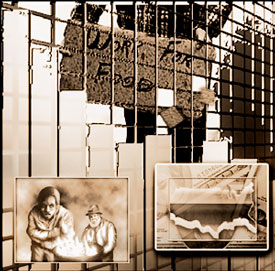
WASHINGTON (FinalCall.com) – There’s federal government poor, and then there’s Mississippi poor. Mississippi poor is worse. According to a report recently released by the Census Bureau, Mississippi is one of five states and the District of Columbia with the highest poverty rate in the country.
All across America, the poor are getting poorer with the South leading the way. The nation’s official poverty rate rose from 11.7 percent in 2001 to 12.1 percent in 2002 and median household money income declined 1.1 percent in real terms from 2001 to $42,409 in 2002, according to new U.S. Census Bureau data issued September 26. According to the official poverty measure, about 1.7 million more people were in poverty in 2002 than in 2001 (34.6 million versus 32.9 million). These estimates reflect the effect of the recession, which began in March 2001 and ended in November of the same year.
“These numbers are a continuation of what we’ve seen after past recessions. The economy has been declared in recovery, but it takes an additional two years for the effects to be seen,” Dr. William Spriggs of the National Urban League’s Institute for Opportunity and Equality told The Final Call.
“Those numbers are for 2002. We have to ask the question, what will they look like for this year? At the end of September, we’re still down 1 million jobs and the labor market is tougher.”
He added, “More people are unemployed for longer periods, like 26 weeks which is considered a long time. The numbers are getting worse.”
The facts of life
The poverty rate and number of families in poverty increased from 6.8 million in 2001 (or 9.2 percent of all families) to 7.2 million (or 9.6 percent) in 2002. The poverty rates for children, those 65 and over, non-Hispanic Whites, Asians, Hispanics, female-householder families, those in central cities or outside metropolitan areas and people in the Northeast, South and West did not change between 2001 and 2002.
“Poverty rates rose among people aged 18-64, among married couple families, in the Midwest and in the suburbs of metropolitan areas,” said Joe Dalaker, statistician in the Poverty and Health Statistics Branch of the U.S. Census Bureau.
The number of people in severe poverty increased from 13.4 million in 2001 to 14.1 million in 2002, and the number just above the poverty threshold, 12.5 million, did not change.
“The Census Bureau uses 48 different dollar amounts, called thresholds, to compute poverty data. For example, a family of four, with two children and two adults, had a threshold of $18,244,” said Mr. Dalaker
Median earnings increased 1.8 percent for women who worked full-time, year-round and 1.4 percent for similar men, and the child poverty rate remained unchanged, in spite of the recession.
“Looking at the 2001-2002 average, poverty rates increased in 9 states, and fell in none,” said Mr. Dalaker.
For Blacks in 2002, 24.1 percent were in poverty, higher than the 22.7 percent for those who reported Black on the census in 2001. The corresponding figure for those reporting Black regardless of whether they reported any other races in 2002 was 23.9 percent.
According to the official measure, the Midwest was the only region whose poverty rate increased between 2001 and 2002, from 9.4 percent to 10.3 percent. The poverty rates in the Northeast (10.9 percent), West (12.4 percent) and South (13.8 percent) did not change.
The official poverty rates ranged from about 5.6 percent in New Hampshire and Minnesota to about 18.0 percent in Arkansas, Mississippi, New Mexico, Louisiana, West Virginia and the District of Columbia, according to a three-year average (2000 to 2002).
The poverty rates remained unchanged in 41 states and the District of Columbia, while they increased in Arkansas, Florida, Hawaii, Illinois, Maine, Michigan, Mississippi, South Carolina and Utah, based on comparisons of two sets of two-year averages, 2000-2001 and 2001-2002.
“We’re in the middle of a horrible recession,” said Dr. Spriggs, “The deficit is getting larger and larger. The problem is that this deficit is not creating jobs.”
“The government usually spends money which puts them in a deficit to create jobs. It’s a long-term investment. People then will pay taxes, so the money will be recouped in the long run.”
He added, “Now, President Bush is just running up a debt to finance the war in Iraq. At the end of the day, he’s just running up a debt like it’s a party.”












